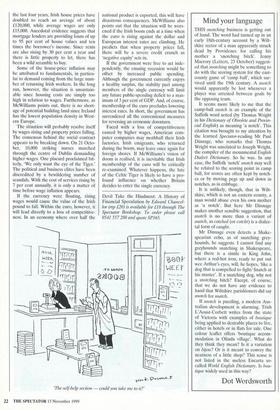Mind your language
THIS snotching business is getting out of hand. The word had turned up in an early 18th-century account by a Wilt- shire rector of a man apparently struck dead by Providence for calling his mother a 'snatching bitch'. Jenny Macrory (Letters, 23 October) suggest- ed that snotching might be something to do with the scoring system for the east- county game of 'camp ball', which sur- vived until the 19th century. A snotch would apparently be lost whenever a player was arrested between goals by the opposing team.
It seems more likely to me that the camp-ball snotch is an example of the Suffolk word noted (by Thomas Wright in his Dictionary of Obsolete and Provin- cial English) as meaning 'a notch'. This citation was brought to my attention by the learned Spectator-reading Mr Paul Dinnage, who remarks that Thomas Wright was unrelated to Joseph Wright, the compiler of the monumental English Dialect Dictionary. So he was. In any case, the Suffolk 'notch' snotch may well be related to the scoring point in camp ball, for scores are often kept by notch- es or by moving pegs up and down in notches, as in cribbage.
It is unlikely, though, that in Wilt- shire, which is not an eastern county, a man would abuse even his own mother as 'a notch'. But here Mr Dinnage makes another sensible suggestion, that snotch is no more than a variant of snatch, as cotched (or cotcht) is a dialec- tal form of caught.
Mr Dinnage even detects a Shake- spearian echo, as of snatching grey- hounds, he suggests. I cannot find any greyhounds snatching in Shakespeare, but there is a simile in King John, where a red-hot iron, ready to put out wee Arthur's eyes, will, he hopes, 'like a dog that is compelled to fight/ Snatch at his master'. If a snatching dog, why not a snotching bitch? Except, of course, that we do not have any evidence to hand that Wiltshire parishioners did say snotch for snatch.
If snotch is puzzling, a modern Aus- tralian development is alarming. Trials L'Aoust-Corbett writes from the state of Victoria with examples of boutique being applied to desirable places to live, either in hotels or in flats for sale. One colour leaflet offers 'boutique accom- modation in Olinda village'. What do they think they mean? Is it a variation on bijou? Or is it meant to convey the neatness of a little shop? This sense is not listed in the useless Encarta so- called World English Dictionary. Is bou- tique widely used in this way?
Dot Wordsworth


























































































 Previous page
Previous page